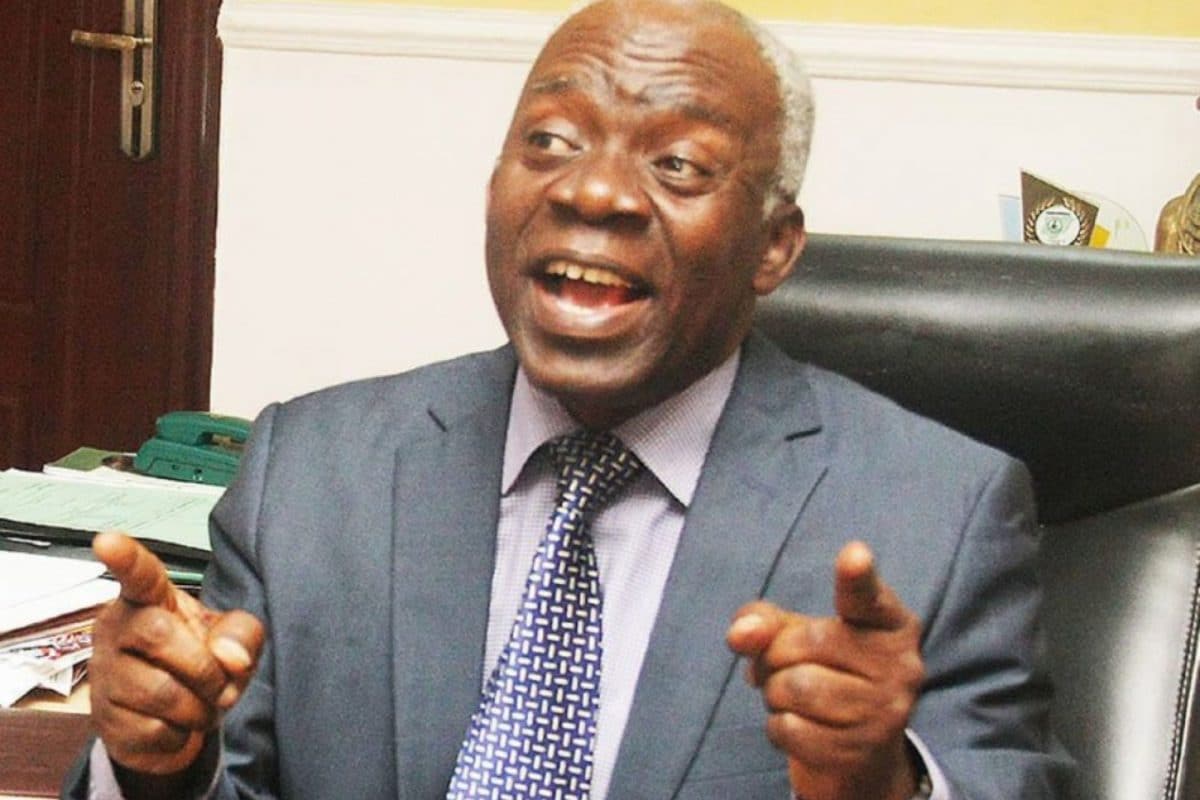A Senior Advocate of Nigeria (SAN) and Human Rights Advocate, Chief Femi Falana has said the controversy being generated by Chief Olisa Agbakobia (SAN) on whether the Economic and Financial Crimes Commission (EFCC) has the right to probe state frauds is needless.
Newsonline reports that Falana said many cases have been instituted in the past and settled at different courts in the country on whether the EFCC Act gave the commission right to probe fraud committed by state government public officers.
Falana who made his position known on Thursday in a press release said the threat by Agbakobia that he would approach a Federal High Court to challenge the decision of EFCC to trial Kogi State governor, Yahaya Bello’s nephew, Aliyu Bello over an N10 billion money laundering charge was needless.
The statement read in part, “my respected colleague and comrade in the human rights community, Olisa Agbakoba SAN has questioned the legal competence of the anti-graft agencies to investigate the finances of state governments. He feels so convinced about his position that he has announced his intention to approach the federal high court to secure a perpetual injunction restraining the EFCC from probing the accounts of state governments.
READ ALSO: Kogi: EFCC Warns Agbakobia On Bello’s Nephew N10bn Fraud Case
“The controversy is completely needless in view of the fact that the appellate courts have held that the anti-graft agencies are competent to arrest, investigate and prosecute public officers and private individuals involved in the criminal diversion of public fund belonging to state governments. Some of the cases include the following: Kalu v. Federal Republic of Nigeria (2014) 1 NWLR (PT 1389) 479.
“The locus standi of the EFCC to prosecute the Appellants was questioned by the Appellants who raised several objections to the charges on the grounds that the funds allegedly stolen belonged to the Abia State government.
“The Appellants contended that they should not have been charged in the name of the Federal Republic of Nigeria.
“The Court of Appeal entertained no difficulty in dismissing the objections. In the leading judgment of the Court Eko JCA (as he then was) said, “The Appellants have incorrectly in my view, argued that the money laundering offences alleged against them are offences against Abia State Government that owns the funds allegedly “stolen and laundered in the account of Slok Nigeria Limited.
“This argument is rooted in another fallacious ground that the funds allegedly stolen and paid into the account of Slok Nigeria Limited were from the Security Vote of Abia State that were managed by the 2nd Respondent, as the Governor of Abia State, and that the said Security Votes are ’unaccountable and unretiredable’.
“The argument does not say, and it cannot be further stretched to mean, that because the funds from Security Votes are ‘unaccountable and unretireable’ they are stealable or and can be pilfered with impunity.”
“Kalu V Federal Republic Of Nigeria & Ors [2016] NGSC 34 Completely dissatisfied with the decision of the Court of Appeal the appellants appealed to the Supreme Court. In dismissing the appeal their lordships said:
“The Appellant’s argument that he neither had shares in nor was he the alter ego of Slok Ltd and the illegality of withdrawal of some huge sums of money from the Account of Abia State Government of which he was the Executive Governor from 1999 to 2007; all these are matters for his defence at trial.
“Sections 6 (m) and 46 of the Economic and Financial Crimes Commission (Establishment) Act vest in EFCC the function and duty of investigating and prosecuting persons reasonably suspected to have committed economic and financial crimes. For a person to rush to court to place a clog or shield against criminal investigation and prosecution is a clear interference with the powers given by law and the constitution to EFCC in the conduct of criminal investigation and prosecution.”














